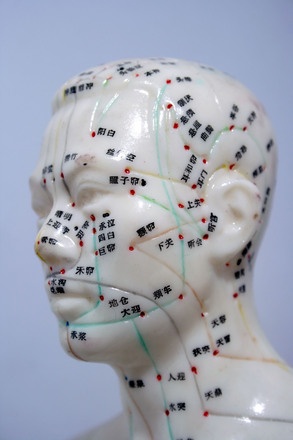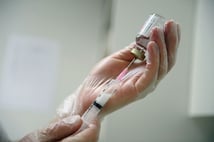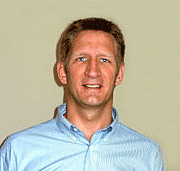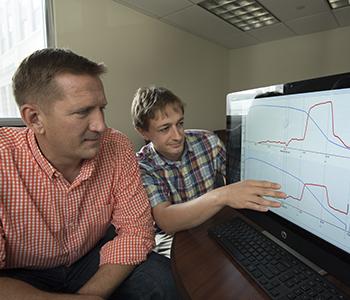 Researchers at the University of California, Irvine have recently found that people with hypertension can benefit from electroacupuncture – a form of acupuncture that uses electrical currents to stimulate various pressure points in the body.
Researchers at the University of California, Irvine have recently found that people with hypertension can benefit from electroacupuncture – a form of acupuncture that uses electrical currents to stimulate various pressure points in the body.
Tags: CA, Medical Research, University of California Irvine, California, 2015, Irvine, NIH funding, Southwest Region, UCI, pulmonary hypertension, UC Irvine, NIH grants, BioResearch Product Faire™, acupuncture
Until recently, nerve damage has been considered irreparable and impossible to treat. Only now are we seeing breakthroughs in nerve care such as Washington University’s study on preventing axon degeneration and UC Irvine’s study on regenerating nerves with salmon protein. Taking things one step farther, a University of Minnesota, Twin Cities research group has developed a method to foster nerve regrowth using 3D printing.
Read MoreTags: University of Minnesota Twin Cities, 2015, BioResearch Product Faire Event, MN, UMinn, Twin Cities
 The flu is something that everyone experiences at some time. Even after receiving an annual flu shot, many people still fall ill due to a different strain of the flu that the shot does not protect against. Generally, the flu shot protects against three common strains of influenza, leaving people still vulnerable to getting the flu. Researchers at Rockefeller University have developed a new method of creating the flu vaccine that could potentially work against many more strains of influenza. (Image courtesy of Wikimedia Commons).
The flu is something that everyone experiences at some time. Even after receiving an annual flu shot, many people still fall ill due to a different strain of the flu that the shot does not protect against. Generally, the flu shot protects against three common strains of influenza, leaving people still vulnerable to getting the flu. Researchers at Rockefeller University have developed a new method of creating the flu vaccine that could potentially work against many more strains of influenza. (Image courtesy of Wikimedia Commons).
Tags: Rockefeller University, Northeast, influenza research, New York, 2015, RockU, BioResearch Product Faire Event, NY
 Washington State University recently announced that it has surpassed its $1 billion fundraising goal, making 2015 its highest funded fiscal year to date.
Washington State University recently announced that it has surpassed its $1 billion fundraising goal, making 2015 its highest funded fiscal year to date.
Tags: Washington, WA, WSU, Washington State University, 2015, Research Funding, Northwest Region, new grant, Pullman, new endowed faculty, new building expansion, New Life Science Funding, BioResearch Product Faire™, fundraising
Though there is currently no known cure for human immunodeficiency virus (HIV), bioscientists at research universities across the globe are looking into ways to mitigate the disease. In our country, we’ve recently seen St. Louis researchers use bee venom to puncture HIV viruses and Twin Cities researchers investigate a genetic immunity to HIV. At Michigan State University, a team has discovered an inhibitor to the virus that is found inside the human body.
Read MoreTags: Michigan State University, 2015, BioResearch Product Faire Event, MI, East Lansing, MSU
 For over 50 years, Stony Brook University in New York has been a venue for thousands of groundbreaking discoveries made by prominent medical researchers and clinicians.
For over 50 years, Stony Brook University in New York has been a venue for thousands of groundbreaking discoveries made by prominent medical researchers and clinicians.
Tags: Lyme Disease, cancer research, New York, Stony Brook University, 2015, Pediatric Research, Research Funding, NY, Northeast Region, Stony Brook, research grants, SunySB
A rational approach to tackling diabetes using life science research is to focus on insulin. We’ve seen a research team at Emory University transplant insulin-producing cells, and we’ve reported on an Urbana-Champaign team trying to release insulin in patients’ cells. Now researchers at Washington University at St. Louis are taking a new approach by directly reducing blood sugar without the use of insulin.
 Brian Finck (image left, courtesy WUSTL) believes that rather than rely on insulin to lower blood sugar in patients with diabetes, it’s easier to cut out the middle man and reduce glucose levels using genetics. He and fellow WUSTL professor Kyle McCommis found that shutting down a particular liver protein dramatically reduced glucose production in the liver.
Brian Finck (image left, courtesy WUSTL) believes that rather than rely on insulin to lower blood sugar in patients with diabetes, it’s easier to cut out the middle man and reduce glucose levels using genetics. He and fellow WUSTL professor Kyle McCommis found that shutting down a particular liver protein dramatically reduced glucose production in the liver.
“We think this strategy could lead to more effective drugs for type 2 diabetes,” says Finck, who is an associate professor of medicine in the Division of Geriatrics and Nutritional Science. “A drug that shuts down glucose production has the potential to help millions of people affected by the most common form of diabetes.”

(Brian N. Finck, PhD (left), and Kyle S. McCommis, PhD analyze blood sugar levels to evaluate their new strategy. Image courtesy WUSTL)
The team has already initiated clinical trials using the drug compound MSDC-0602. So far, the drugs have been successful in inhibiting the protein and reducing blood sugar levels. Dr. Finck is working with the biopharmaceutical company Metabolic Solutions Development Co. to facilitate production of the drug.
Funding for this research came from the National Institute of Diabetes and Digestive and Kidney Diseases and the National Institute on Alcohol Abuse and Alcoholism of the National Institutes of Health as well as the Foundation for Barnes-Jewish Hospital and the Robert A.Welch Foundation. For additional information about funding for research at Washington University in St. Louis, read our free WUSTL Funding Statistics Report, available via the link below:
Read MoreTags: WashU, Washington University in St. Louis, 2015, BioResearch Product Faire Event, MO, St Louis

The University of Southern California is expanding yet again, thanks in part to a recent $10 million gift from USC Trustee Malcolm Currie and his wife, Barbara. The gift will help support the Keck School of Medicine of USC, as well as construction of the new USC Michelson Center for Convergent Bioscience.
Read MoreTags: CA, Bioresearch, University of Southern California, Biomedical expansion, Microscopy, California, USC, Medicine, School of Medicine, 2015, new construction, Southwest Region, new Building, New research center
Yeasts are valuable as both tools and allies in the life sciences. We saw how yeast taught Ann Arbor researchers about DNA and showed Urbana-Champaign researchers how to save bats from a deadly disease. Now a team at the University of Michigan at Ann Arbor is learning from yeasts how to slow the onset of another deadly disease, namely cancer.
Read MoreTags: University of Michigan Ann Arbor, 2015, Ann Arbor, BioResearch Product Faire Event, MI, UMich
 Researchers from the Washington State University School of Pharmacy have recently uncovered a previously unknown function of a protein called Activating Transcription Factor 5 (ATF5).
Researchers from the Washington State University School of Pharmacy have recently uncovered a previously unknown function of a protein called Activating Transcription Factor 5 (ATF5).
Tags: Washington, WSU Pullman, WA, cancer research, cell biology, WSU, Washington State University, Biology, 2015, Pharmacy, Northwest Region, Pullman, BioResearch Product Faire™

